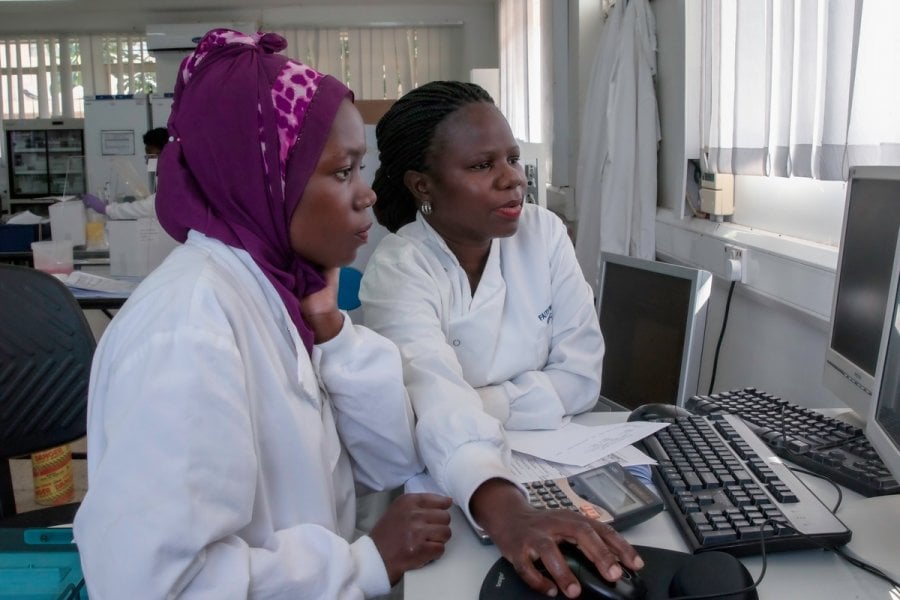Rapid local sequencing generates the first Ugandan SARS-CoV-2 full genomes
3 July 2020 London School of Hygiene & Tropical Medicine London School of Hygiene & Tropical Medicine https://lshtm.ac.uk/themes/custom/lshtm/images/lshtm-logo-black.png
Researchers in a laboratory, MRC/UVRI & LSHTM Uganda Research Unit, Entebbe, Uganda
The first Severe Acute Respiratory Syndrome Coronavirus 2 (SARS-CoV-2) full genomes in Uganda have been generated using rapid local sequencing, through research led by MRC/UVRI and LSHTM Uganda Research Unit and the Uganda Virus Research Institute (UVRI), published in Emerging Infectious Diseases.
The sequencing work was supported by funding from the UK Medical Research Council (MRC/UKRI), the UK Department for International Development (DFID) and Wellcome.
As a diagnostic tool, whole genome sequences confirm the identity of disease-causing pathogens and can be further used for studying diversity, tracing movement of virus strains, and designing models that can predict the disease spread and for better interventions.
Careful monitoring and additional sequence data from Uganda cases will allow an estimate of the amount of transmission that may occur from international travellers and neighbouring countries into the Uganda community.
Dan Lule Bugembe, a senior laboratory technologist at the MRC/UVRI and LSHTM Uganda Research Unit and key laboratory scientist in this research said:
"Establishing local SARS-CoV-2 sequencing capacity is essential to help Uganda control this virus. The sequences reported here will provide an important baseline for tracking any further transmission of the virus in the country.”
Data from twenty viral genomes from individuals who at the onset of the pandemic in Uganda arrived from regions with circulating SARS-CoV-2 were obtained using Nanopore sequencing. Working closely with scientists in the UVRI diagnostic laboratories, SARS-CoV-2 positive samples were identified, the virus genetic materials extracted and its composition determined.
The resulting virus genome sequences were then compared to virus sequences from the global epidemic to learn about the geographical origin of the infections, to identify virus lineages and to examine the viral proteins for any consistent changes.
Professor Matthew Cotten, a senior Virologist at the MRC/UVRI and LSHTM Uganda Research Unit and Principal Investigator for this work said:
"In the initial SARS-CoV-2 genomes imported into Uganda we observed 6 lineages imported through air travelers and truck drivers entering Uganda. This reveals how quickly this virus can move around the world."
MRC/UVRI and LSHTM Uganda Research Unit and UVRI host state of the art laboratories. UVRI is an accredited Africa CDC Centre of excellence in COVID-19 diagnostics.
Prof. Pontiano Kaleebu, the Director of UVRI and MRC/UVRI and LSHTM Uganda Research Unit and co-principal investigator, said:
“As part of Uganda’s effort to understand the disease, monitor and control virus transmission, we need to carefully describe the viruses that have entered and may circulate in Uganda and the region. These data will help identify sources of new infections, validate diagnostic efforts and provide new data for vaccine and drug efforts.”
The MRC/UVRI and LSHTM Uganda Research Unit’s work in supporting the country’s national response plan for COVID-19 has received a further £2.7 million funding boost from the Medical Research Council and UK Research and Innovation.
This will support the Unit’s diagnostic testing, sequencing, clinical support and community-based surveillance assessing the impact of the virus and pandemic mitigation strategies in Uganda.
More than 150,000 tests have been conducted at UVRI and other testing sites in the country. The research team will continue to sequence and document the various SARSCoV2 strains registered in the country.
As of 2 July 2020, 721 SARS-CoV-2 genome sequences from Africa are available in GISAID (https://www.gisaid.org/ ) from North Africa (Algeria: 3, Egypt: 86, Morocco: 39, Tunisia: 8), South Africa: 175, Central Africa (DRC: 152) and West Africa (Senegal: 63, Benin: 12, Gambia: 17, Ghana: 15, Nigeria: 18) and now with the data reported here, East Africa (Uganda:20, Kenya 112).
Detailed sequence data from East Africa will help in identifying sources of new infections and will benefit efforts to control movement between countries in the Africa continent.
Publication
Daniel Lule Bugembe, John Kayiwa, My V.T. Phan, Phiona Tushabe, Stephen Balinandi, Beatrice Dhaala, Jonas Lexow, Henry Mwebesa, Jane Aceng, Henry Kyobe, Deogratius Ssemwanga, Julius Lutwama, Pontiano Kaleebu, and Matthew Cotton. Main Routes of Entry and Genomic Diversity of SARS-CoV-2, Uganda. Emerging Infectious Diseases. DOI: 10.3201/eid2610.202575
If you enjoyed this article and would like to build a career in global health, we offer a range of MSc programmes covering health and data, infectious and tropical diseases, population health, and public health and policy.
Available on campus or online, including flexible study that works around your work and home life, be part of a global community at the UK's no.1 public health university.